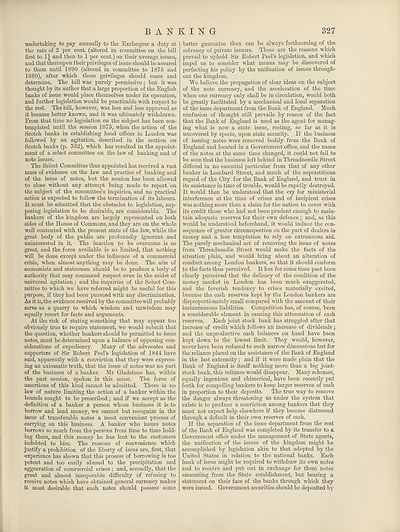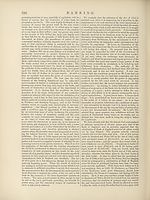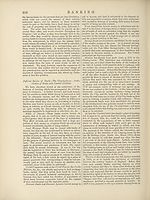Encyclopaedia Britannica > Volume 3, Athens-BOI
(339) Page 327
Download files
Complete book:
Individual page:
Thumbnail gallery: Grid view | List view

327
BANKING
undertaking to pay annually to the Exchequer a duty at
the rate of 2 per cent, (altered in committee on the bill
first to 1|- and then to 1 per cent.) on their average issues,
and that thereupon their privileges of issue should be assured
to them until 1890 (altered in committee to 1875 and
1880), after which these privileges should cease and
determine. The bill was purely permissive; but it was
thought by its author that a large proportion of the English
banks of issue would place themselves under its operation,
and further legislation would be practicable with respect to
the rest. The bill, however, was less and less approved as
it became better known, and it was ultimately withdrawn.
From that time no legislation on the subject has been con¬
templated until the session 1875, when the action of the
Scotch banks in establishing head offices in London was
followed by an agitation, described in the section on
Scotch banks (p. 332), which has resulted in the appoint¬
ment of a select committee on the law of banking and of
note issues.
The Select Committee thus appointed has received a vast
mass of evidence on the law and practice of banking and
of the issue of notes, but the session has been allowed
to close without any attempt being made to report on
the subject of the committee’s inquiries, and no practical
action is expected to follow the termination of its labours.
It must be admitted that the obstacles to legislation, sup¬
posing legislation to be desirable, are considerable. The
bankers of the kingdom are largely represented on both
sides of the House of Commons, and they are on the whole
well contented with the present state of the law, while the
great body of the public are profoundly ignorant and
uninterested in it. The inaction to be overcome is so
great, and the force available is so limited, that nothing
will be done except under the influence of a commercial
crisis, when almost anything may be done. The aim of
economists and statesmen should be to produce a body of
authority that may command respect even in the midst of
universal agitation; and the inquiries of the Select Com¬
mittee to which we have referred might be useful for this
purpose, if they had been pursued with any discrimination.
As it is, the evidence received by the committee will probably
serve as a quarry to which wisdom and unwisdom may
equally resort for facts and arguments.
At the risk of stating something that may appear too
obviously true to require statement, we would submit that
the question, whether bankers should be permitted to issue
notes, must be determined upon a balance of opposing con¬
siderations of expediency. Many of the advocates and
supporters of Sir Robert Peel’s legislation of 1844 have
said, apparently with a conviction that they were express¬
ing an axiomatic truth, that the issue of notes was no part
of the business of a banker. Mr Gladstone has, within
the past session, spoken in this sense. The force of
assertions of this kind cannot be admitted. There is no
law of nature limiting the action of a banker within the
bounds sought to be prescribed; and if we accept as the
definition of a banker a person whose business it is to
borrow and lend money, we cannot but recognize in the
issue of transferable notes a most convenient process of
carrying on this business. A banker who issues notes
borrows so much from the persons from time to time hold¬
ing them, and this money he has lent to the customers
indebted to him. The reasons of convenience which
justify a prohibition of the liberty of issue are, first, that
experience has shown that this process of borrowing is too
potent and too easily abused to the precipitation and
aggravation of commercial crises; and, secondly, that the
great and almost insuperable difficulty of refusing to
receive notes which have obtained general currency makes
it most desirable that such notes should possess some
better guarantee than can be always forthcoming of the
solvency of private issuers. These are the reasons which
prevail to uphold Sir Robert Peel’s legislation, and which
impel us to consider what means may be discovered of
perfecting his policy by the unification of issues through¬
out the kingdom.
We believe the propagation of clear ideas on the subject
of the note currency, and the acceleration of the time
when one currency only shall be in circulation, would both
be greatly facilitated by a mechanical and local separation
of the issue department from the Bank of England. Much
confusion of thought still prevails by reason of the fact
that the Bank of England is used as the agent for manag¬
ing what is now a state issue, resting, so far as it is
uncovered by specie, upon state security. If the business
of issuing notes were removed bodily from the Bank of
England and located in a Government office, and the name
of the notes at the same time changed, it could not fail to
be seen that the business left behind in Threadneedle Street
differed in no essential particular from that of any other
banker in Lombard Street, and much of the superstitious
regard of the City for the Bank of England, and trust in
its assistance in time of trouble, would be rapidly destroyed.
It would then be understood that the cry for ministerial
interference at the time of crises and of incipient crises
was nothing more than a claim for the nation to cover with
its credit those who had not been prudent enough to main¬
tain adequate reserves for their own defence; and, as this
would be understood beforehand, it would induce the con¬
sequence of greater circumspection on the part of dealers in
money and a less temptation to rely on extraneous aid.
The purely mechanical act of removing the issue of notes
from Threadneedle Street would make the facts of the
situation plain, and would bring about an alteration of
conduct among London bankers, so that it should conform
to the facts thus perceived. It has for some time past been
clearly perceived that the delicacy of the condition of the
money market in London has been much exaggerated,
and the feverish tendency to crises materially excited,
because the cash reserves kept by the London bankers are
disproportionately small compared with the amount of their
instantaneous liabilities. Competition has, of course, been
a considerable element in causing this attenuation of cash
reserves. Each joint stock bank has struggled after that
increase of credit which follows an increase of dividends ;
and the unproductive cash balances on hand have been
kept down to the lowest limit. They would, however,
never have been reduced to such narrow dimensions but for
the reliance placed on the assistance of the Bank of England
in the last extremity; and if it were made plain that the
Bank of England is itself nothing more than a big joint-
stock bank, this reliance would disappear. Many schemes,
equally ingenious and chimerical, have been recently put
forth for compelling bankers to keep larger reserves of cash
in proportion to their deposits. The true way to remove
the danger always threatening us under the system that
exists is to produce a conviction among bankers that they
must not expect help elsewhere if they become distressed
through a default in their own reserves of cash.
If the separation of the issue department from the rest
of the Bank of England was completed by its transfer to a
Government office under the management of State agents,
the unification of the issues of the kingdom might be
accomplished by legislation akin to that adopted by the
United States in relation to the national banks. Each
bank of issue might be required to withdraw its own notes
and to receive and put out in exchange for them notes
emanating from the State establishment, but bearing a
statement on their face of the banks through which they
were issued. Government securities should be deposited by
BANKING
undertaking to pay annually to the Exchequer a duty at
the rate of 2 per cent, (altered in committee on the bill
first to 1|- and then to 1 per cent.) on their average issues,
and that thereupon their privileges of issue should be assured
to them until 1890 (altered in committee to 1875 and
1880), after which these privileges should cease and
determine. The bill was purely permissive; but it was
thought by its author that a large proportion of the English
banks of issue would place themselves under its operation,
and further legislation would be practicable with respect to
the rest. The bill, however, was less and less approved as
it became better known, and it was ultimately withdrawn.
From that time no legislation on the subject has been con¬
templated until the session 1875, when the action of the
Scotch banks in establishing head offices in London was
followed by an agitation, described in the section on
Scotch banks (p. 332), which has resulted in the appoint¬
ment of a select committee on the law of banking and of
note issues.
The Select Committee thus appointed has received a vast
mass of evidence on the law and practice of banking and
of the issue of notes, but the session has been allowed
to close without any attempt being made to report on
the subject of the committee’s inquiries, and no practical
action is expected to follow the termination of its labours.
It must be admitted that the obstacles to legislation, sup¬
posing legislation to be desirable, are considerable. The
bankers of the kingdom are largely represented on both
sides of the House of Commons, and they are on the whole
well contented with the present state of the law, while the
great body of the public are profoundly ignorant and
uninterested in it. The inaction to be overcome is so
great, and the force available is so limited, that nothing
will be done except under the influence of a commercial
crisis, when almost anything may be done. The aim of
economists and statesmen should be to produce a body of
authority that may command respect even in the midst of
universal agitation; and the inquiries of the Select Com¬
mittee to which we have referred might be useful for this
purpose, if they had been pursued with any discrimination.
As it is, the evidence received by the committee will probably
serve as a quarry to which wisdom and unwisdom may
equally resort for facts and arguments.
At the risk of stating something that may appear too
obviously true to require statement, we would submit that
the question, whether bankers should be permitted to issue
notes, must be determined upon a balance of opposing con¬
siderations of expediency. Many of the advocates and
supporters of Sir Robert Peel’s legislation of 1844 have
said, apparently with a conviction that they were express¬
ing an axiomatic truth, that the issue of notes was no part
of the business of a banker. Mr Gladstone has, within
the past session, spoken in this sense. The force of
assertions of this kind cannot be admitted. There is no
law of nature limiting the action of a banker within the
bounds sought to be prescribed; and if we accept as the
definition of a banker a person whose business it is to
borrow and lend money, we cannot but recognize in the
issue of transferable notes a most convenient process of
carrying on this business. A banker who issues notes
borrows so much from the persons from time to time hold¬
ing them, and this money he has lent to the customers
indebted to him. The reasons of convenience which
justify a prohibition of the liberty of issue are, first, that
experience has shown that this process of borrowing is too
potent and too easily abused to the precipitation and
aggravation of commercial crises; and, secondly, that the
great and almost insuperable difficulty of refusing to
receive notes which have obtained general currency makes
it most desirable that such notes should possess some
better guarantee than can be always forthcoming of the
solvency of private issuers. These are the reasons which
prevail to uphold Sir Robert Peel’s legislation, and which
impel us to consider what means may be discovered of
perfecting his policy by the unification of issues through¬
out the kingdom.
We believe the propagation of clear ideas on the subject
of the note currency, and the acceleration of the time
when one currency only shall be in circulation, would both
be greatly facilitated by a mechanical and local separation
of the issue department from the Bank of England. Much
confusion of thought still prevails by reason of the fact
that the Bank of England is used as the agent for manag¬
ing what is now a state issue, resting, so far as it is
uncovered by specie, upon state security. If the business
of issuing notes were removed bodily from the Bank of
England and located in a Government office, and the name
of the notes at the same time changed, it could not fail to
be seen that the business left behind in Threadneedle Street
differed in no essential particular from that of any other
banker in Lombard Street, and much of the superstitious
regard of the City for the Bank of England, and trust in
its assistance in time of trouble, would be rapidly destroyed.
It would then be understood that the cry for ministerial
interference at the time of crises and of incipient crises
was nothing more than a claim for the nation to cover with
its credit those who had not been prudent enough to main¬
tain adequate reserves for their own defence; and, as this
would be understood beforehand, it would induce the con¬
sequence of greater circumspection on the part of dealers in
money and a less temptation to rely on extraneous aid.
The purely mechanical act of removing the issue of notes
from Threadneedle Street would make the facts of the
situation plain, and would bring about an alteration of
conduct among London bankers, so that it should conform
to the facts thus perceived. It has for some time past been
clearly perceived that the delicacy of the condition of the
money market in London has been much exaggerated,
and the feverish tendency to crises materially excited,
because the cash reserves kept by the London bankers are
disproportionately small compared with the amount of their
instantaneous liabilities. Competition has, of course, been
a considerable element in causing this attenuation of cash
reserves. Each joint stock bank has struggled after that
increase of credit which follows an increase of dividends ;
and the unproductive cash balances on hand have been
kept down to the lowest limit. They would, however,
never have been reduced to such narrow dimensions but for
the reliance placed on the assistance of the Bank of England
in the last extremity; and if it were made plain that the
Bank of England is itself nothing more than a big joint-
stock bank, this reliance would disappear. Many schemes,
equally ingenious and chimerical, have been recently put
forth for compelling bankers to keep larger reserves of cash
in proportion to their deposits. The true way to remove
the danger always threatening us under the system that
exists is to produce a conviction among bankers that they
must not expect help elsewhere if they become distressed
through a default in their own reserves of cash.
If the separation of the issue department from the rest
of the Bank of England was completed by its transfer to a
Government office under the management of State agents,
the unification of the issues of the kingdom might be
accomplished by legislation akin to that adopted by the
United States in relation to the national banks. Each
bank of issue might be required to withdraw its own notes
and to receive and put out in exchange for them notes
emanating from the State establishment, but bearing a
statement on their face of the banks through which they
were issued. Government securities should be deposited by
Set display mode to:
![]() Universal Viewer |
Universal Viewer | ![]() Mirador |
Large image | Transcription
Mirador |
Large image | Transcription
Images and transcriptions on this page, including medium image downloads, may be used under the Creative Commons Attribution 4.0 International Licence unless otherwise stated. ![]()
| Encyclopaedia Britannica > Encyclopaedia Britannica > Volume 3, Athens-BOI > (339) Page 327 |
|---|
| Permanent URL | https://digital.nls.uk/193654708 |
|---|
| Attribution and copyright: |
|
|---|---|
| Shelfmark | EB.17 |
|---|---|
| Description | Ten editions of 'Encyclopaedia Britannica', issued from 1768-1903, in 231 volumes. Originally issued in 100 weekly parts (3 volumes) between 1768 and 1771 by publishers: Colin Macfarquhar and Andrew Bell (Edinburgh); editor: William Smellie: engraver: Andrew Bell. Expanded editions in the 19th century featured more volumes and contributions from leading experts in their fields. Managed and published in Edinburgh up to the 9th edition (25 volumes, from 1875-1889); the 10th edition (1902-1903) re-issued the 9th edition, with 11 supplementary volumes. |
|---|---|
| Additional NLS resources: |
|

